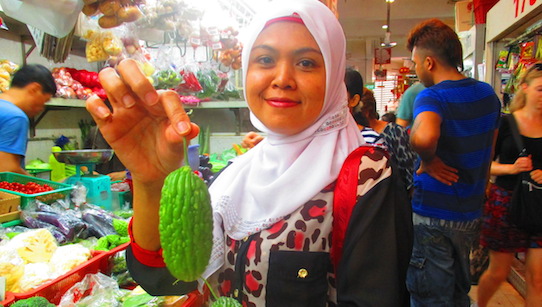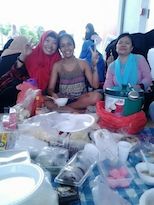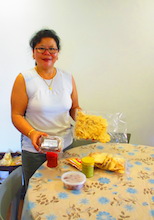
To share or not to share:
Food security and social inequality among migrant domestic workers in Singapore
Student Research Award Report by Charlene Mohammad

Charlene Enjoying Indonesian
food with her domestic worker
friends on Hari Raya

A dish that a domestic worker
prepared for Hari Raya
As part of my research, I participated in food-related activities with the domestic workers, in which I joined many of the women in their eating, cooking and food shopping activities. I also had the honour of participating in many social events with the women and their friends on their days off, in order to understand their lives from their perspectives. Some of the events included a sports tournament, Hari Raya celebrations, beach parties, a concert, and a fashion show. These gatherings are very special because FDWs in Singapore only have one day off a week at most, which is usually on a Sunday, and many having only one day off a month or no days off at all. Thus, when the women finally have the opportunity to meet with their friends, they make the most of their time out. The public spaces where FDWs hang out are always vibrant on Sundays. One can always see the women singing and dancing, and sharing delicious foods from their homes countries as they connect with fellow migrant workers who have now become their family network in the new country. When I had the privilege of attending some of these outings with the domestic workers, I developed a deep understanding how important social bonds are for maintaining the health and well-being of migrants in a new country. These experiences also allowed me to learn that preparing and sharing foods from their home countries is one of the ways in which these migrant women can feel at home in a new place.

An Indonesian domestic worker
showcasing the delicious food
products which she prepares in
her employer’s home and sells
on the weekends at various events.
Food access in employers’ homes, where the domestic workers live and work, also plays a role in the health and well-being of the women while they are in Singapore. The household food access of the women ranged from some participants consistently experiencing hunger in their employers’ homes to others regularly dining in 4-5 star restaurants with their employers. When the women experienced restrictions on food access, they would eat smaller amounts of and poorer quality food than their employers and often had little time to eat the food that was available to them because they had too many daily tasks to complete in the house. Some of the women who had positive experiences with food were on track to becoming professional chefs and opening restaurants of their own in Indonesia. One woman, in particular, won a cooking competition on the Asian Food Channel and has attended cooking classes with internationally renowned chefs. Though there was a range of ways in which the domestic workers experienced food security, there were a couple universal findings in my study: 1. The domestic workers always missed the food from their home country and preferred it to Singaporean foods. 2. The women who had children in Indonesia were always concerned about what their children were eating while they were working in Singapore. Regardless of how Indonesian domestic workers experience food in Singapore, food is evidently an important part of their lives.

Beef Rendang, a delicious dish
from Sumatra, which was
prepared by an Indonesian domestic
worker and Charlene.
Having the opportunity to conduct one of the first qualitative studies focusing on the food security of Indonesian domestic workers in Singapore allowed me to hear the experiences and concerns of the domestic workers from their perspectives. Over the next year, I plan to mobilize my findings and thesis as a way to showcase the success stories of the Indonesian domestic workers in my study, as well as advocate for the food security rights for all foreign domestic workers in Singapore. I thank the Centre for Asia-Pacific Initiatives, the Social Sciences and Humanities Research Council, the Department of Anthropology and my supervisory committee for supporting my research!
